Buying A Home As A Single Parent: 6 Tips That Can Help
April 17, 2021
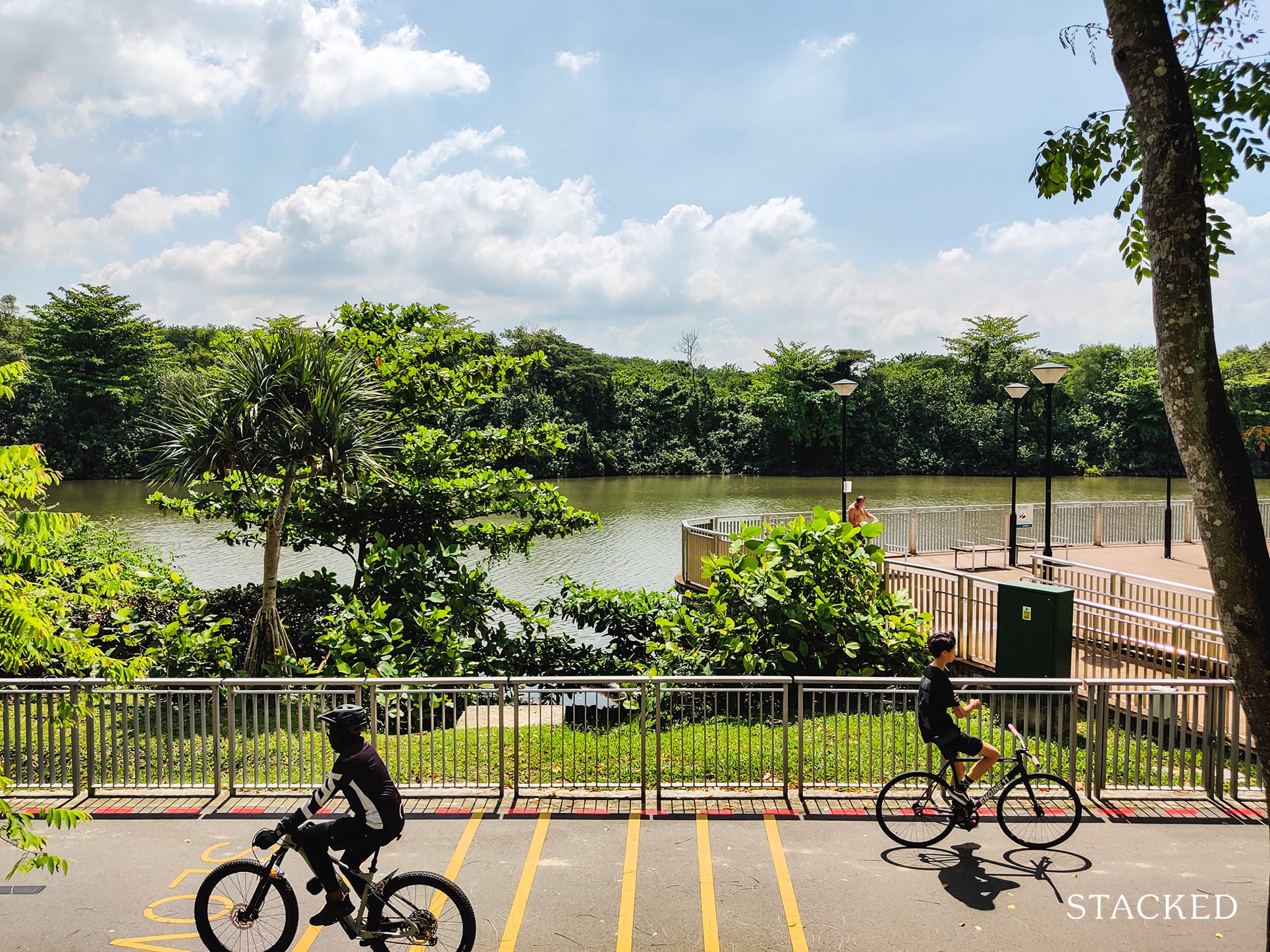
Single parents are in a tough spot in Singapore: public housing isn’t easily available to them, while private housing tends to be beyond the single income range. As such, it takes more effort for single parents to find the right property. Here’s a rundown on the restrictions typically faced, and how you might plan around them:
So many readers write in because they're unsure what to do next, and don't know who to trust.
If this sounds familiar, we offer structured 1-to-1 consultations where we walk through your finances, goals, and market options objectively.
No obligation. Just clarity.
Learn more here.
Key concerns in buying an HDB flat
- Citizenship
- Age requirement
- Income ceiling
- Half the grant amount for single buyers (except for the PHG)
- Restrictions on size for BTO
- New ECs only accessible via JSS
- Mortgage Servicing Ratio (MSR)
1. Citizenship
Singles can buy an HDB flat under the Single Singapore Citizen Scheme (SSCS) or Joint Singles Scheme (JSS). The latter allows up to four unrelated singles to co-own a flat.
However, both schemes require you to be a Singapore citizen.
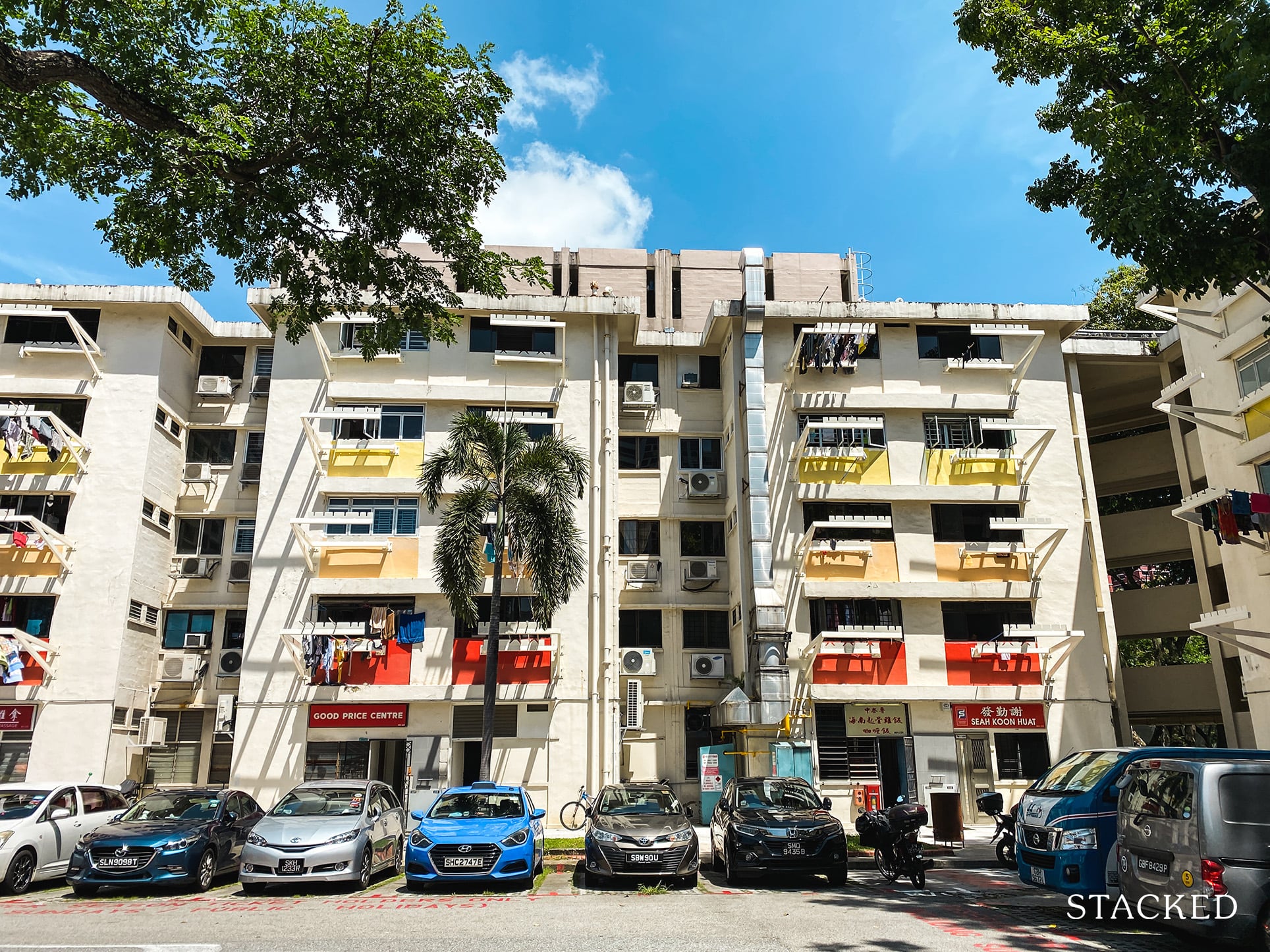
2. Age requirement
To buy an HDB flat as a single, you have to be at least 35 years old (the other usual restrictions, such as ethnic quotas and being a Singaporean or Permanent Resident, also apply).
If you’re unmarried or divorced, and have legal custody of a child, you and your child can form a family nucleus. This allows you to buy flats under the public scheme from the age of 21, subject to the usual eligibility requirements.
Another exception to the age requirement is if you and your siblings are orphans. In this case, you can apply to buy under the Orphans Scheme; this allows you and your siblings to jointly buy an HDB flat, from the age of 21 and up.
Note that under the Joint Singles Scheme (JSS), you can also buy from age 21 if you’re an orphan or widowed. However, unmarried or divorced singles must still be 35 years old to buy under the JSS.
3. Income ceiling
For single buyers, take note that your income cannot exceed $7,000 per month if you want to buy an HDB flat.
If you have variable income (e.g., you are a freelancer or work on commissions), exceptions may be made; this typically means counting your assessable income as being 30 per cent lower.
You can write an appeal to HDB to explain your situation, if you bust the income ceiling.
4. Half the grant amount for single buyers
If you’re the only buyer involved (i.e. you are buying under the SCSS), you only get half the Enhanced Housing Grant (EHG) amount. For example, the maximum grant amount for a single buyer is $40,000. For usual couples or those buying under the JSS, the maximum grant can go up to $80,000.
The following is the Enhanced Housing Grant (EHG) based on your income:
| Income | EHG (Singles) Amount |
| Not more than $750 | $40,000 |
| $751 to $1,000 | $37,500 |
| $1,001 to $1,250 | $35,000 |
| $1,251 to $1,500 | $32,500 |
| $1,501 to $1,750 | $30,000 |
| $1,751 to $2,000 | $27,500 |
| $2,001 to $2,250 | $25,000 |
| $2,251 to $2,500 | $22,500 |
| $2,501 to $2,750 | $20,000 |
| $2,751 to $3,000 | $17,500 |
| $3,001 to $3,250 | $15,000 |
| $3,251 to $3,500 | $12,500 |
| $3,501 to $3,750 | $10,000 |
| $3,751 to $4,000 | $7,500 |
| $4,001 to $4,250 | $5,000 |
| $4,251 to $4,500 | $2,500 |
There’s no grant available beyond this income level. Do note, however, that you can appeal for certain variable or non-guaranteed income sources – such as year-end bonuses – to be excluded from your assessable income.
If you’re buying a resale flat, you can still get the Proximity Housing Grant (PHG). You’re eligible so long as you live within four kilometres of your parents. This is up to $15,000 for singles.
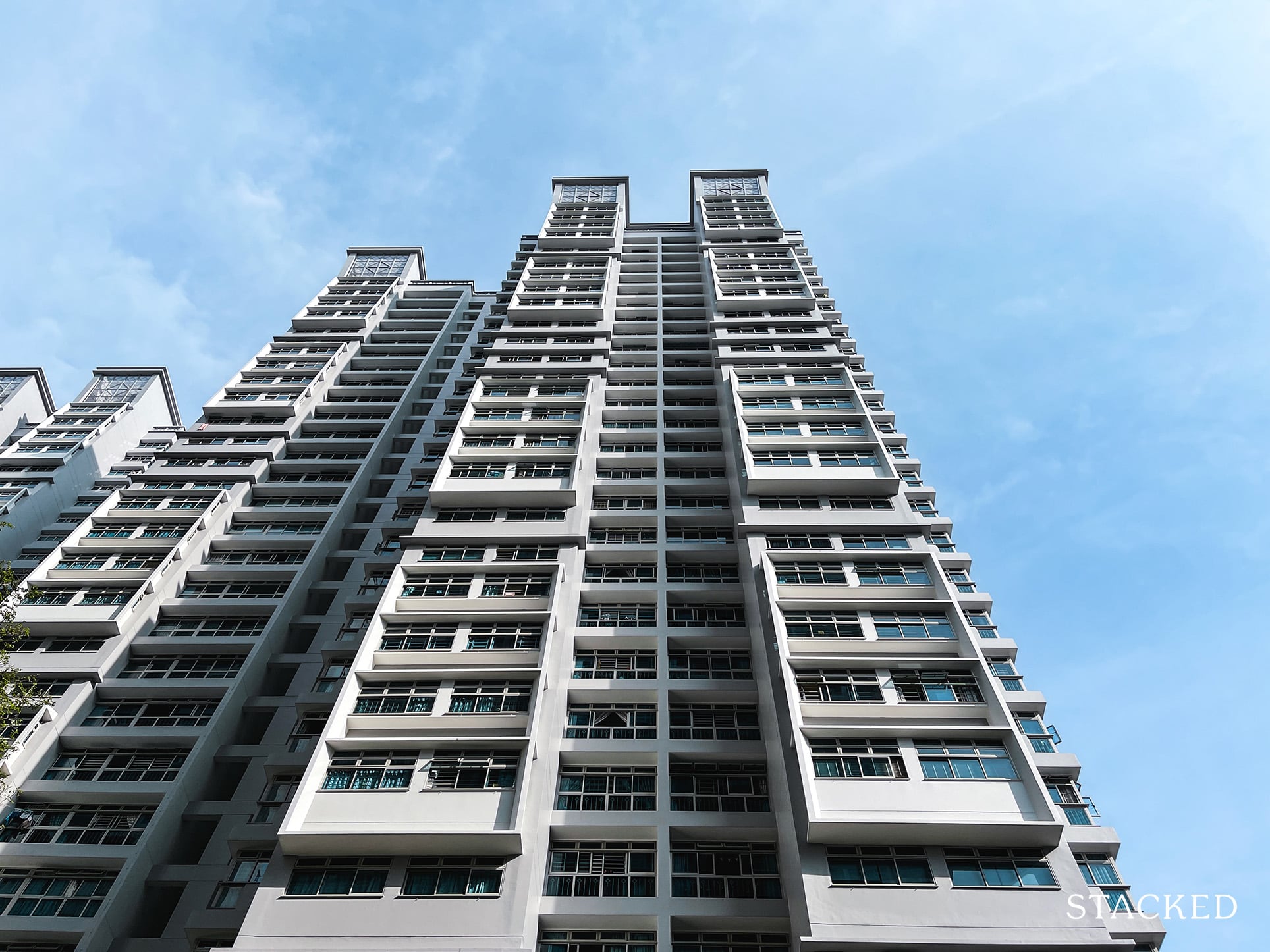
5. Restrictions for size on BTO
Singles who want a Built To Order (BTO) flat can only buy 2-room or 3-room flats in non-mature estates. Note that HDB has an Assistance Scheme for Second Timers (ASSIST). Under ASSIST, five per cent of 2 and 3-room flats in non-mature estates are set aside for divorced or widowed parents, with children below 18 years of age.
This restriction does not apply to resale flats. You can purchase any size of resale flat, in any location.
6. New ECs only accessible via JSS
You cannot buy a new Executive Condominium (EC) under the SCSS, but you can under the JSS (you still need to be 35 years old to buy under JSS).
If you have access to the Public Scheme (i.e., you and your child form a family nucleus as in point 1), you can buy a new EC under this scheme.
You always buy resale EC units without restrictions (whether or not they’re privatised yet).
7. Mortgage Servicing Ratio (MSR)
This is not something specific to single parents; however, we feel it’s worth pointing out as the MSR is especially tight for single buyers.
When you purchase any HDB property, the required home loan repayment – whether you use a bank or HDB loan – can never exceed 30 per cent of your monthly income. This threshold is the MSR.
So if you earn $3,000 a month, the MSR limit is $900 per month. This would generally restrict you to a maximum loan of about $242,000 (for 25 years at an interest rate of 2.6 per cent).
This will have an additional impact on the size and location of the home you can afford.
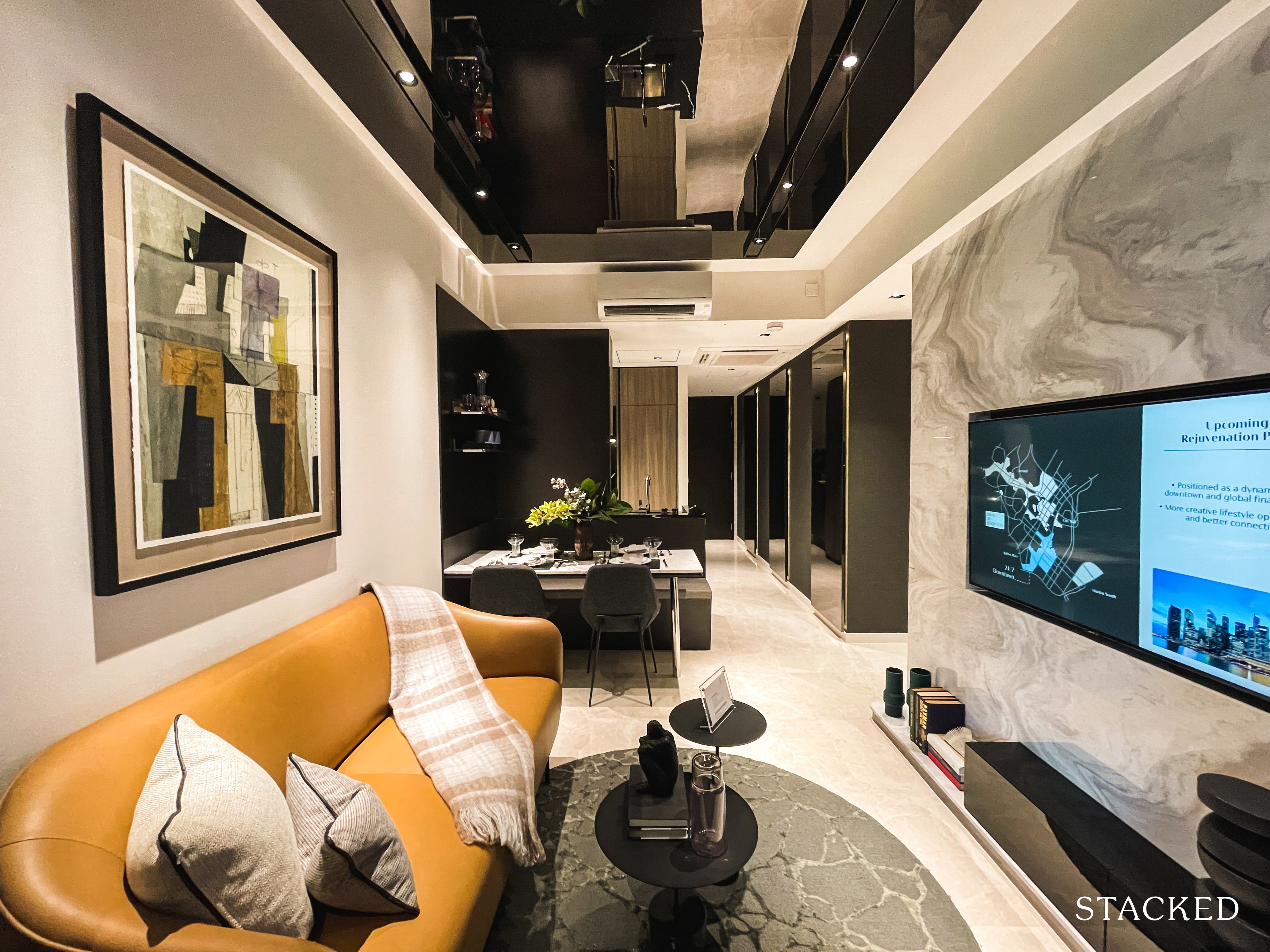
Key concerns in buying a private property
The irony is that, while there are no restrictions on what private properties a single parent can buy, the cost makes them inaccessible to singles; especially singles who also have dependents.
Besides the required down payment (minimum of five per cent down payment in cash, and the next 20 per cent in cash or CPF), the main hurdle is the Total Debt Servicing Ratio (TDSR).
The TDSR restricts all loan repayments – that means education loans, personal loans, etc. on top of your home loan – to 60 per cent or less of your monthly income. If you earn $5,000 a month, for example (the minimum realistic amount for a single to even consider private property), your TDSR cap is $3,000.
In addition, note that banks apply a simulated interest rate of 3.5 per cent when working out your TDSR. Overall, if you earn $5,000 a month, this would restrict your loan size to $600,000. That will leave you with a private property at $800,000, which is typically a one-bedder.
We’d also point out that 60 per cent of your income going into home loan repayment is dangerous for single parents, who also have to consider their child’s expenses.
What are some possible workarounds for single parents?
- HDB assistance schemes
- Apply for your flat early, if you can
- Stick to HDB loans, despite the higher interest rate
- Start with a small resale flat and progress upward
- Minimise all other debts due to the servicing ratios
- Accept co-owners only as a last resort
1. HDB assistance schemes
If you absolutely cannot find any form of housing, HDB can give you access to public rental flats. This is reviewed on a case-by-case basis, but do appeal to them if you need it.
If you’re a divorced or widowed single parent, you get access to a public rental flat as temporary accommodation. This can tide you over while your BTO flat is under construction.
For help and details, apply under the Parenthood Provisional Housing Scheme (PPHS).
2. Apply for your flat early, if you can
Recent changes to HDB policy allow you to apply for a flat as soon as you get the Interim Judgement of Divorce. This means you can start settling housing issues at the same time as you’re handling issues like custody, division of assets, etc.
Unfortunately, this doesn’t lift any restrictions on which flats you can own; but the earlier you start looking, the less you’ll need in the way of temporary accommodation.
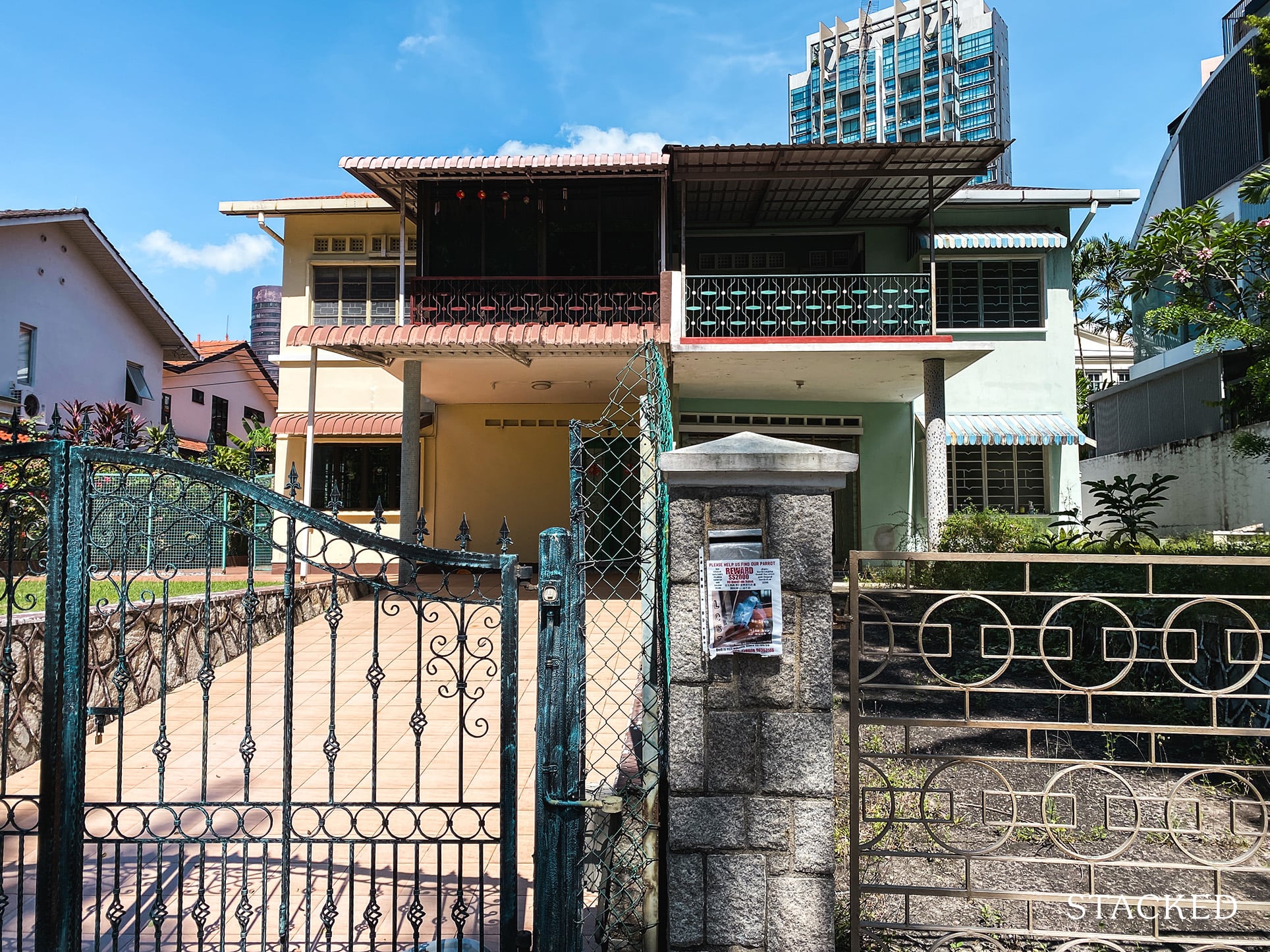
Property Market Commentary5 Common Scenarios In A Divorce Settlement: How Your Property Will Be Divided
by Ryan J. Ong3. Stick to HDB loans, despite the higher interest rate
Bank interest rates are much lower than HDB loan rates (as low as 1.2 per cent at the time of writing). But in spite of this, single parents should stick to using HDB loans.
First, keep in mind that servicing ratios like the TDSR are based on an interest rate of 3.5 per cent, not the actual rate. This means you’re not more likely to get loan approval, despite the lower rate.
Second, HDB’s main goal is to keep you housed, whereas banks are business entities. HDB has the leeway to grant you extensions, if you’re unable to pay the mortgage; and they will take your children into consideration.
Banks may be unable to do this even if they wanted to – they’re a business with an obligation to their stakeholders / shareholders. As such, foreclosure is quicker and more certain if you miss the mortgage.
At any rate, HDB loans also provide up to 90 per cent financing, with potentially zero cash down. This is more helpful to your immediate cash flow.
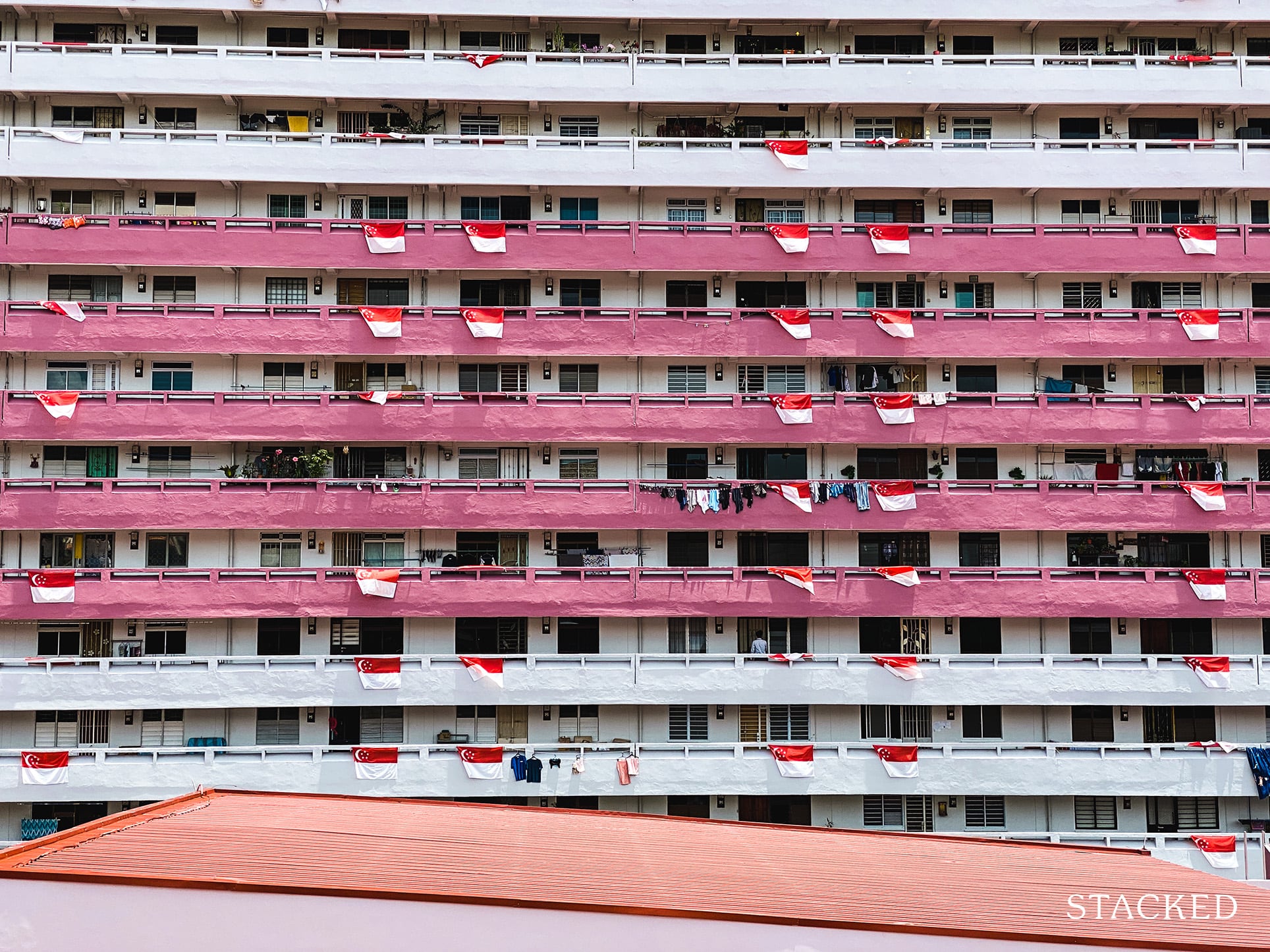
4. Start with a small resale flat and progress upward
While resale flats may cost a bit more, they are unrestricted in terms of location. This matters to single parents, as it allows you to be close to a school of your choice.
As an aside, bear in mind there’s a five-year Minimum Occupation Period (MOP), so do think how this will affect your child’s schooling. You cannot, for instance, sell and move on the third year to be closer to a given school. Also, the MOP begins after key collection; so if you get a BTO flat that takes four years to build, you won’t be moving for about nine years.
Even though resale flats have fewer size restrictions, it’s best not to go overboard. Don’t buy a flat that’s bigger than you need, as they already cost more than new flats as is. Start small and build your savings, so you have more options to progress in later years (i.e., more savings to move to a bigger flat near your child’s university, or even a private property).
Besides, resale flats allow you to move in right away; and if it’s a three-room or larger, you can even start renting out a room immediately (but make sure it’s a trusted tenant, to keep the children safe).
5. Minimise all other debts due to the servicing ratios
The more outstanding debts you have, the more difficult it is to qualify for home loans; especially bank loans. Even if you make repayments on time, having too many sources of credit can still lower your credit rating.
(You can check your current credit rating with the Credit Bureau of Singapore, which costs around $6).
The lower your loan quantum, the more cash you need to pay upfront. Car loans are a common cause of failed loan applications / higher down payments, so it’s best to buy the car after the home.
6. Accept co-owners only as a last resort
While having a co-owner may seem like godsend, be aware of the potential conflicts down the road. For example, what happens if you decide you need to sell, but the other co-owners don’t agree? Or what happens if one party loses their income, when the mortgage still needs to be paid?
These issues can be more severe for single parents, who need to be confident of a roof over their children.
As such, it’s best to accept co-owners only after careful consideration, and as a last resort. Be wary of having siblings or other relatives as co-owners, as this can sour family relationships in a dispute.
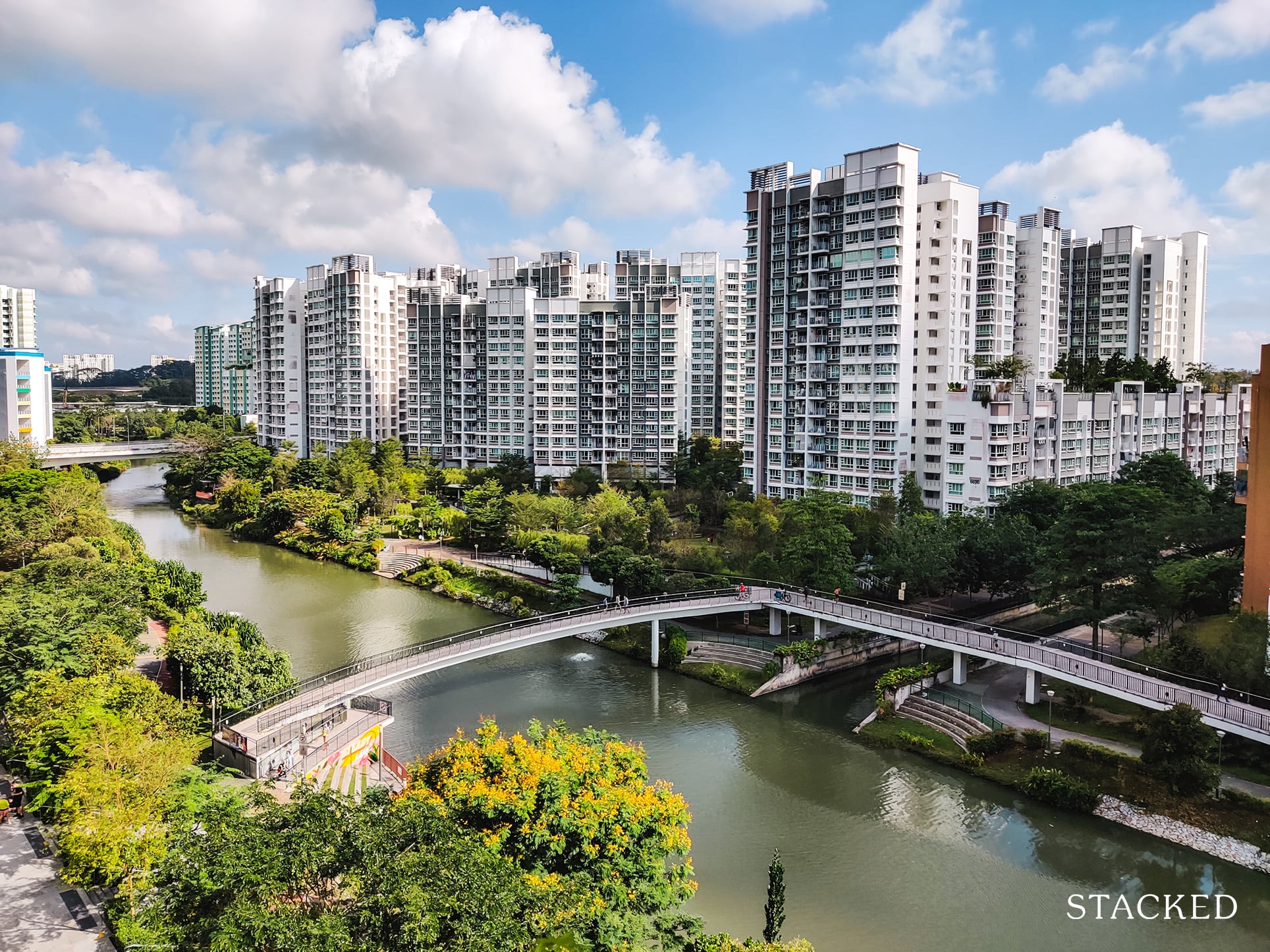
Finally, if you are buying a private property, remember to buy mortgage insurance
Mortgage insurance is automatic for HDB properties (it’s under the Home Protection Scheme). However, it’s optional – and hence sometimes neglected – for private properties.
Mortgage insurance pays off the outstanding loan in the event of your death, or terminal illness / permanent disability. For single parents, this is a crucial element of protection; the children don’t have another parent to fall back on. Speak to a financial planner or advisor for more details on this.
At Stacked, we like to look beyond the headlines and surface-level numbers, and focus on how things play out in the real world.
If you’d like to discuss how this applies to your own circumstances, you can reach out for a one-to-one consultation here.
And if you simply have a question or want to share a thought, feel free to write to us at stories@stackedhomes.com — we read every message.
Ryan J. Ong
A seasoned content strategist with over 17 years in the real estate and financial journalism sectors, Ryan has built a reputation for transforming complex industry jargon into accessible knowledge. With a track record of writing and editing for leading financial platforms and publications, Ryan's expertise has been recognised across various media outlets. His role as a former content editor for 99.co and a co-host for CNA 938's Open House programme underscores his commitment to providing valuable insights into the property market.Need help with a property decision?
Speak to our team →Read next from Property Advice

Property Advice We Sold Our EC And Have $2.6M For Our Next Home: Should We Buy A New Condo Or Resale?

Property Advice We Can Buy Two HDBs Today — Is Waiting For An EC A Mistake?

Property Advice I’m 55, Have No Income, And Own A Fully Paid HDB Flat—Can I Still Buy Another One Before Selling?

Property Advice We’re Upgrading From A 5-Room HDB On A Single Income At 43 — Which Condo Is Safer?
Latest Posts

Singapore Property News Will the Freehold Serenity Park’s $505M Collective Sale Succeed in Enticing Developers?
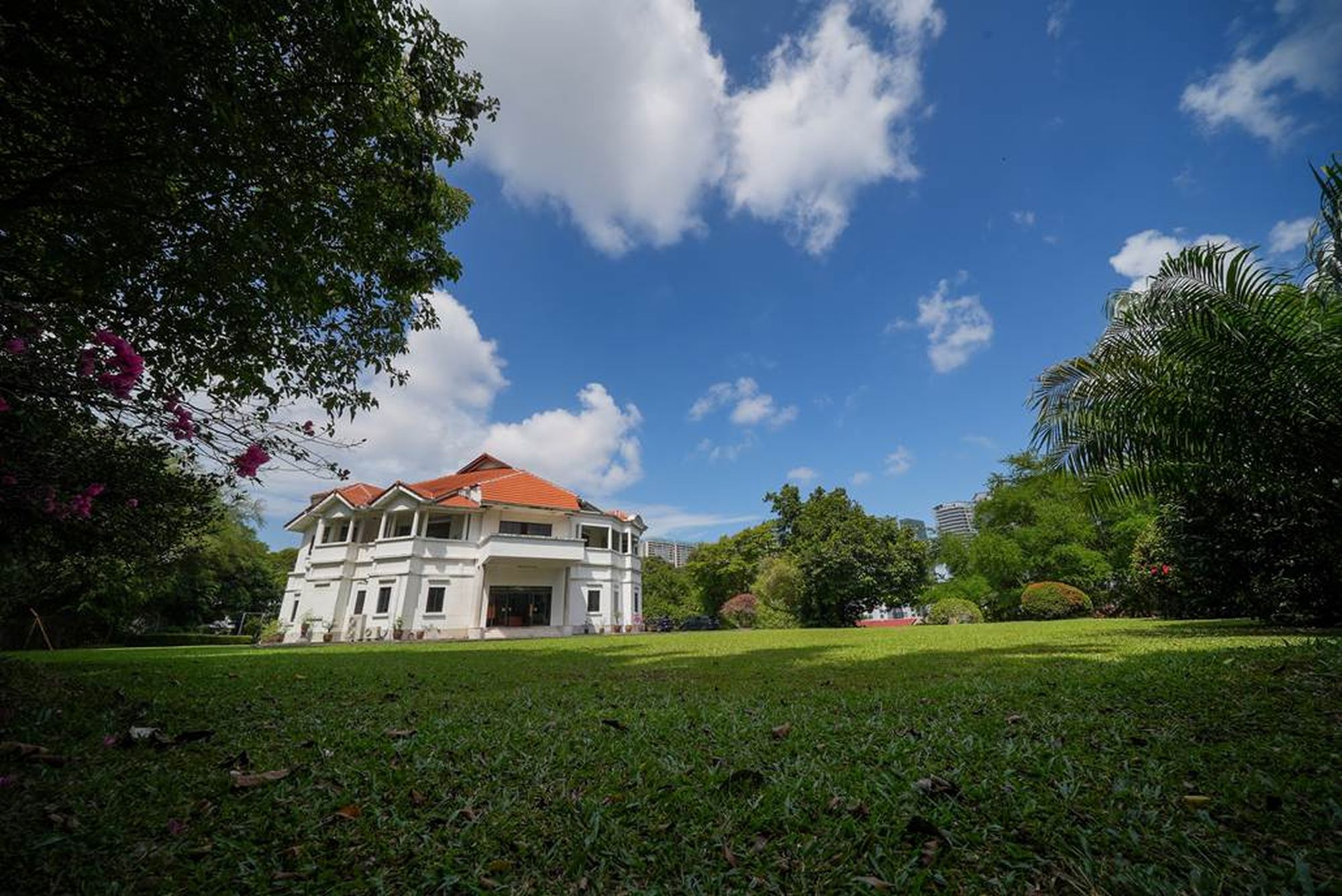
Singapore Property News You Can Now Buy Part Of A $300M Singapore Bungalow — But You Can’t Live In It
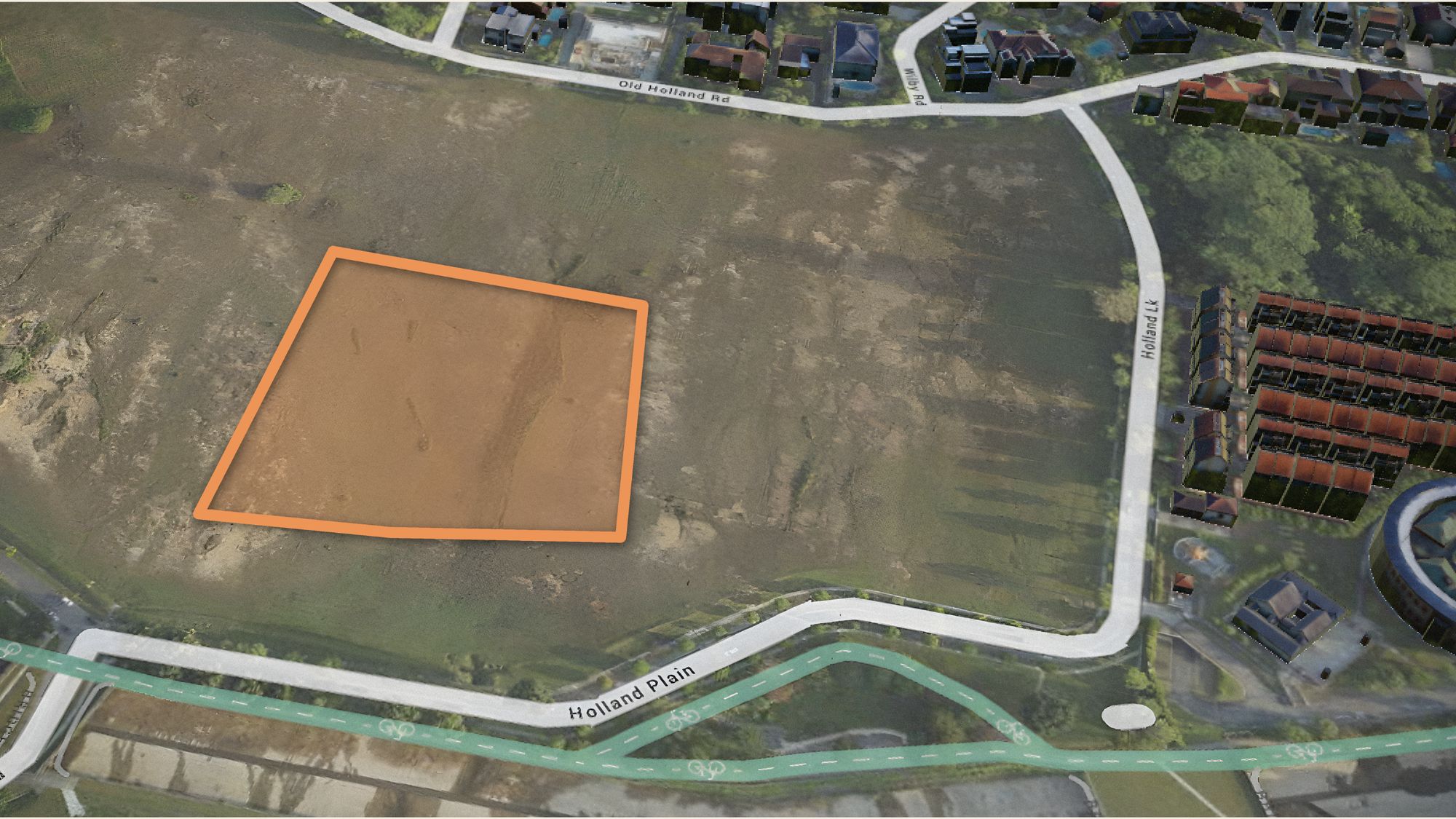
Singapore Property News Two New Prime Land Sites Could Add 485 Homes — But One Could Be Especially Interesting For Buyers



































0 Comments